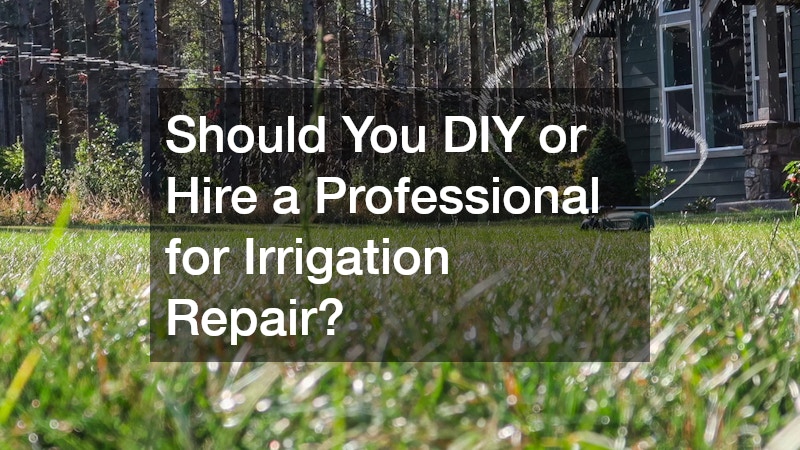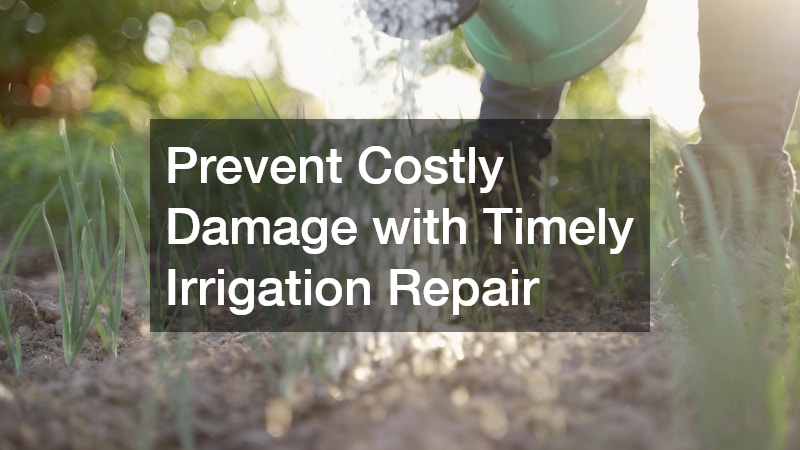Maintaining a lush, healthy landscape requires more than just planting the right greenery or keeping up with seasonal care. A well-functioning irrigation system plays a central role in providing the necessary water to your lawn, garden, or commercial property. However, even minor issues in an irrigation system can escalate if left unchecked. Understanding the importance of timely irrigation repair is crucial not only for preserving plant health but also for avoiding costly expenses down the line. Ignoring or delaying repairs can lead to water waste, structural damage, and unnecessary financial strain.
Why is Timely Irrigation Repair Important?
The Impact on Plant Health
A malfunctioning irrigation system can damage plants, causing dry patches, stressed vegetation, or even death. Over- or underwatering weakens roots and increases pest susceptibility. Timely irrigation repair ensures consistent watering, supporting healthy, vibrant growth.
Preventing Water Waste
Irrigation systems that are not properly maintained can become significant sources of water waste. Leaks, misaligned sprinkler heads, and broken pipes contribute to unnecessary water consumption, which not only increases utility bills but also places a strain on local water resources.
Avoiding Costly Infrastructure Damage
Delaying irrigation repairs can result in more than just harm to plants. Persistent leaks or damaged pipes can erode soil, undermine foundations, and compromise pathways or patios. Unnoticed issues may escalate into significant structural problems that require expensive reconstruction. Addressing problems as soon as they appear prevents further damage and helps protect the long-term integrity of your property.
Long-term Financial Savings
Investing in timely system maintenance saves money. Small fixes prevent costly issues, lower water bills, reduce plant replacement costs, and help maintain property value. Proactive care is always more cost-effective than reactive repairs.
How to Identify Irrigation System Issues Early
Signs of Inefficient Watering
One of the first indicators that your system needs attention is uneven watering. Dry spots, pooling water, or excessively soggy areas signal that sprinklers may be misaligned or malfunctioning. Observing your landscape regularly allows you to catch these problems before they escalate.
Visual and Audible Cues
Beyond uneven watering, other signs can point to underlying issues. Look for broken or tilted sprinkler heads, wet patches where water shouldn’t accumulate, or areas of erosion. Listen for unusual hissing or dripping sounds, which often indicate leaks within the system.
Regular Maintenance Checks
Routine maintenance is key for early detection. Flushing pipes, inspecting sprinkler heads, and testing zones can catch problems early, reducing the risk of major failures and keeping the system efficient.
Professional Assessments and Inspections
Hiring a professional for periodic inspections can uncover hidden issues that may not be visible to the untrained eye. Experts can identify subtle inefficiencies, calibrate system settings, and provide recommendations for optimal performance.
What are the Common Irrigation Repair Methods?
Replacing Broken Sprinkler Heads
Sprinkler heads often fail due to wear, damage, or blockages. Replacing them restores even water distribution and prevents over- or under-watering.
Fixing Leaks and Clogs
Leaks in pipes or fittings, along with clogged emitters, are common problems in irrigation systems. Repairing leaks and clearing blockages ensures that water flows efficiently and reaches the intended areas without waste.
Adjusting Sprinkler Pressure and Coverage
Incorrect water pressure or misaligned sprinklers can lead to uneven watering. Timely adjustments ensure each plant gets the right amount of water.
Updating Control Systems and Timers
Modern irrigation systems often include automated controls and timers. Malfunctioning timers can lead to over- or under-watering.
Should You DIY or Hire a Professional for Irrigation Repair?
Assessing the Complexity of the Repair
Simple fixes, such as replacing a sprinkler head or unclogging an emitter, may be manageable for homeowners with basic tools. However, more complex repairs, including underground pipe leaks or electrical issues with control systems, often require professional expertise.
Weighing the Cost vs. Expertise
While DIY solutions can save money upfront, improper repairs may lead to recurring problems or additional damage. Professionals bring experience, specialized tools, and knowledge that can prevent costly mistakes.
Understanding Safety Considerations
Irrigation systems sometimes involve electrical components and pressurized water lines. Working on these systems without proper training can pose safety risks. Hiring a professional mitigates these hazards and ensures repairs are completed safely.
Benefits of Professional Service
In addition to safety and efficiency, professional service often comes with warranties and guarantees. This provides peace of mind, knowing that the system will operate correctly and issues will be addressed promptly if they arise.
Timely irrigation repair is a cornerstone of effective landscape management. Addressing issues promptly preserves plant health, prevents water waste, protects property infrastructure, and reduces long-term expenses. By recognizing early warning signs, performing routine maintenance, and understanding available repair methods, homeowners and property managers can keep their irrigation systems running efficiently. Whether opting for DIY fixes or hiring a professional, prioritizing timely attention ensures a healthier, more sustainable landscape while safeguarding your investment.



